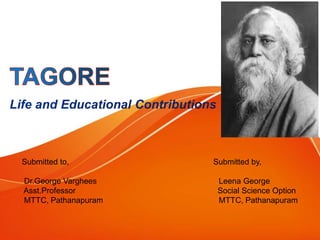
Tagore-Life and educational implicaions.pptx
- 1. Submitted to, Submitted by, Dr.George Varghees Leena George Asst.Professor Social Science Option MTTC, Pathanapuram MTTC, Pathanapuram
- 2. Life History Tagore was born on 6th May 1861 in Bengal in a prosperous family. His father Maharishi Debendranath Tagore, a well known HIndu reformer and his mother was Shrimati Sharada Devi. At primary level his father provided him education in Sanskrit language,Indian philosophy & Astronomy. For higher education he was sent to Bengal Academy where in he developed an aversion to the prevalent dull and rigid education. He was sent to England where in he left it and furtger studied on his own.He gradually started writing in magazines etc. He turned into a dramatist,philosopher and painter. He was then awarded the title of Gurudev He got the Nobel prize in 1913 for Gitanjali. The then Indian govt awarded him with knighthood bestowed in 1915 which he eventually gave away after the Jalyanwalabagh incident He established Vishwa bharati on 22nd sept ,1921whoes aim was to create a synthesis of the east and west. He died in 1914
- 3. • Tagore’s poems are varied in style and subject matter.Tagore’s poetry became most innovative after his exposure to rural Bengal’s folk music. • Gitanjali is his most known collection replicates the true Indian Philosophy in all its glory.
- 4. He had a firm belief in the philosophy of veda. • He believed in “I am Brahma” • There is a spiritual bond between man and man. As an Individualist: He believed in giving right type of freedom to individual. • Every individual is unique. As an Idealist: He believed that the man should live for the ultimate truth which liberates us from cycle of birthg and death. • Had faith in absolute values He believed that every individual should try to attain spiritual perfection.
- 5. As a Humanist: He preached human brotherhood ,having faith in fundamental unity of mankind. • He remarked that “even God depends upon man for perfecting his Universe.” As a Naturalist: He considered nature as a great teacher. • God revealed himself through various forms,colors and rhythm of nature. Tagore’s Internationalism: He was an ardent prophet of world unity. • He believed in world brotherhood.
- 6. Aims of Education • According to Tagore, “ God reveals himself through nature more effectively than through manmade institutions. Hence, the education of the child should be under natural surroundings so that he develops love for all things around him.” • According to Tagore, “That education is highest which not only imparts information and knowledge to us, but also promotes love and follow feeling between us and the living beings of the world.”
- 7. Basic Principles of Tagore’s Philosophy of Education Harmony with all things • Harmony with nature, human surroundings, and harmony in international relations. • His philosophy of education is based on naturalism,humanism, internationalism and idealism. Principle of freedom. Principle of creative self- expression. Active communication with nature and man.
- 8. AIMS Self Realisation Intellectual Development Mother tongue as a medium of instruction Freedom Social Development co-relation of object
- 9. Curriculum 1. Subjects: Literature and Languages, • Mother tongue, other Indian languages and other foreign languages • Mathematics • Natural science such as Botany, Zoology, Physics, Chemistry,General science • Healthn education • Social science like geography, history, Civics, economics and sociology • Agriculture and technical subjects • Arts, music, dance etc • Philosophy
- 10. 2. Activities and Occupations • Dancing • Dramatics • Music • Games and Sports • Drawing and Painting • Excursions • Agriculture and Gardening • Regional study • Laboratory work • Social service
- 11. 3. Actual living and Community service • Teaching while travelling • Debate and discussion method • Activity method • Heuristic method Discipline Against traditional school discipline was in favor of giving freedom to child Believed in self imposed discipline
- 12. Role of Teacher Tagore gave an important place to teacher and asked them to carry out the following activities. Believing in purity and in his own experiences, innocence of child, the teacher should behave with him with great love and affection. Instead of emphasizing on book learning, the teacher should provide conducive environment to the child so that he engages himself in useful and constructive activities and learn by his own experiences. The teacher should always be busy with motivating the creative capacities of the children so that he remain busy with constructive activities and experience.
- 13. • Women Education: He advocated women education. In 1908 he established department for women education in Shantiniketan. • Education for masses(Universal Education) • Vocational Edlucation • Religious Education • Vishwa Bharti In 1901 Tagore set up a school Shantiniketan. Gradually over the years, it developed into Vishwa Bharti - an international university. Teacher and students live together in a spirit of perfect comradeship with the motto ”where the whole world forms its one single nest.”
- 14. Evaluation of Tagore’s Philosophy • According to Radha Krishnan- Rabindranath did not claim to produce any original philosophy. His aim was not to analyze or speculate about the Indian tradition. he expressed in his own vivid phrases and homely metaphors, and showed its relevance to modern life.” • In the words of H. B. Mukherji - Tagore was the gratest prophet of educational renaissance in modern India, He waged ceaseless battle to uphold the highest educational ideal before the country, and conducted educational experiments at his own institutions, which made them living symbols of what an ideal should be.”